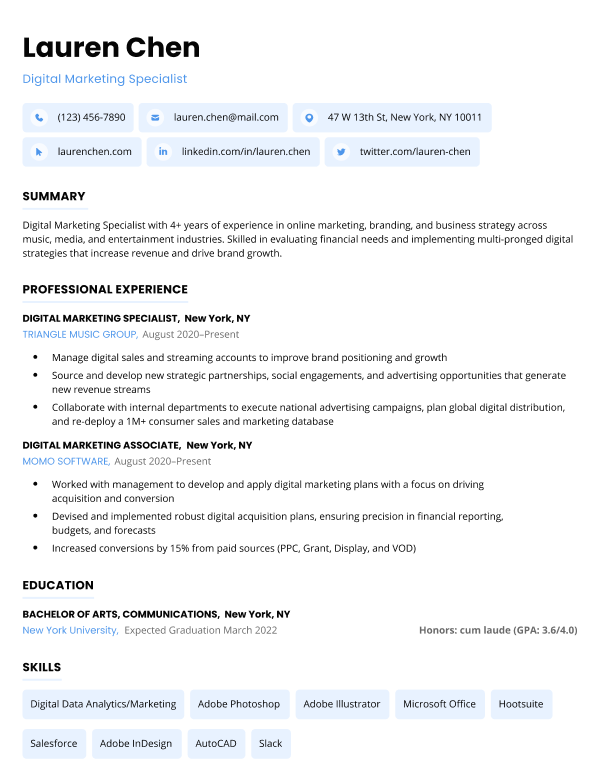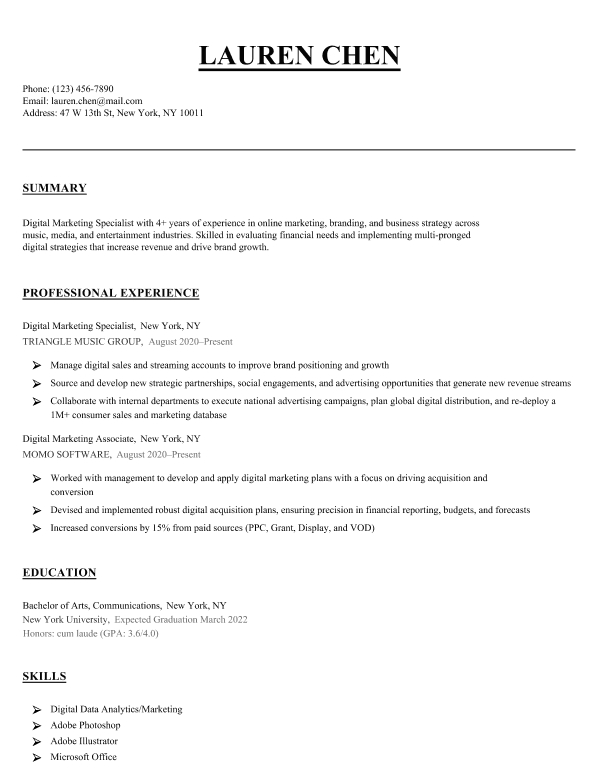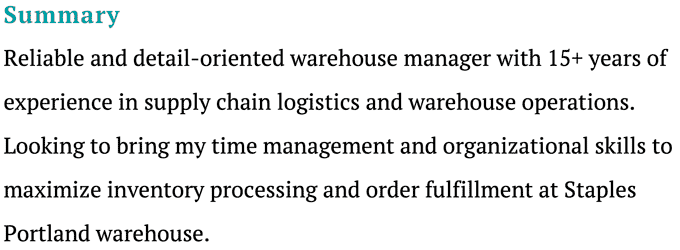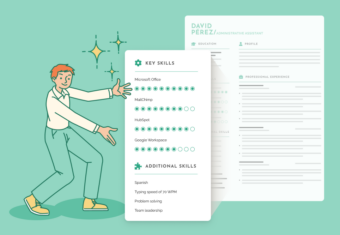Between countless emails, weekly meetings, and daily tasks, it’s easy to feel overwhelmed and fall behind on work. This is why hiring managers are always looking for candidates who have solid time management skills. Keep reading to learn more about time management skills and how to write a resume that emphasizes them.
Our free-to-use resume builder can make you a resume in as little as 5 minutes. Just pick the template you want, and our software will format everything for you.
What are time management skills?
Time management skills are transferable skills that help you decide what you’re going to do and for how long every moment of the day — in both your working and personal life.
Good time management skills help you:
- get more done
- improve the quality of your work
- decrease stress
As a result, developing effective time management skills can bring you better work and life satisfaction as well as prepare you for success in the workplace.
Like other soft skills, time management is learned through practice rather than formal training. But that doesn’t mean you can’t improve your time management skills. There are many articles and self-development courses that teach the fundamentals of good time management.
5 examples of time management skills
Enhance your job application by adding these top time management skills to your resume:
1. Goal setting
Goal setting is important to accomplish everything from small tasks to long-term projects. Set SMART goals to create a rough roadmap for how to get to your destination.
Specific skills related to goal setting include:
- Initiative
- Decision-making
- Self-motivation
- Self-discipline
2. Planning
Planning is organizing your time and resources to complete a goal. While planning may seem like time taken away from action, diving into work without a plan can actually lead to extra work, lost time, and project failures.
Planning-related skills include:
- Setting and meeting deadlines
- Prioritizing
- Scheduling
- Risk assessment
3. Developing and using a time management system
Time management systems are structures that guide how you work. Do you prioritize your work using an urgent-important matrix? Do you keep a to-do list? Do you block out your time for certain tasks? A time management system gets you partially through your planning, no matter the project.
Here are a few examples of time management skills that are part of your time management system:
- Resource management
- Organization
- Breaking down tasks
- Batching and automating tasks
4. Focusing
Being able to focus effectively is essential for your work and personal life. Like your physical muscles, you can also train your attention span. By using smart working strategies, you can maximize the four to five hours of focused work your brain can handle in a day.
Specific focus-related skills include:
- Avoiding procrastination
- Eliminating distractions
- Avoiding multitasking
- Perseverance
5. Setting boundaries
Time management is a zero-sum game, meaning more time spent on one task takes away from time on another task. While saying “no” may disappoint others sometimes, it’s sometimes essential to getting your own work done.
Setting boundaries involves skills like, for example:
- Communication skills
- Delegating
- Stress management
- Avoiding perfectionism
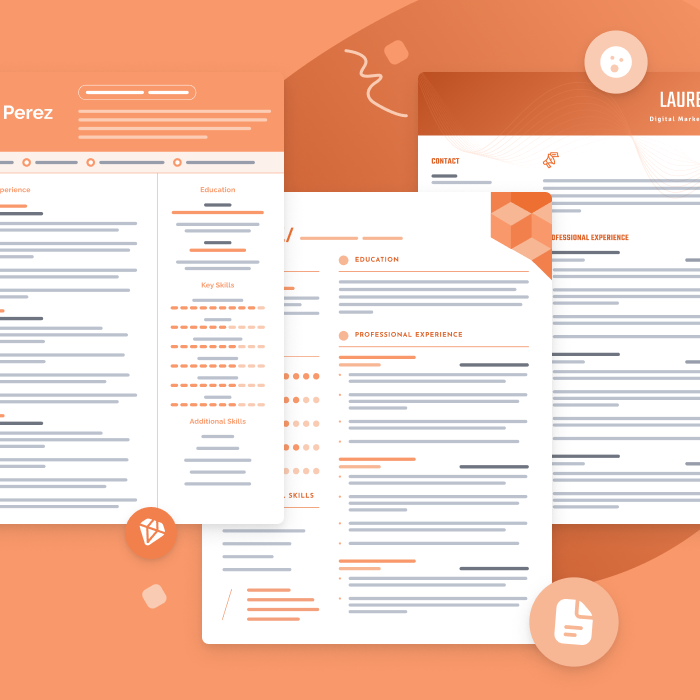
The best resume templates for 2024
One of the best ways to make your resume is by filling out one of our free resume templates. All our templates are designed by experts and free to download for Microsoft Word or Google Docs.
Why good time management is important in 2024
Remote work is more popular than ever, and this is likely to become a continuing trend. According to a Gallup survey on remote work trends, many Americans continue to prefer working out of the office. But without adapting and developing your time management skills, your productivity is likely to take a hit.
Here are a few specific reasons why time management skills are essential for your life and your career:
Home offices can make focusing hard
You may get distracted or procrastinate more without bosses and colleagues around for accountability. When you work remotely, you also have added distractions like children and TV.
Stay focused by using the following methods:
- choosing an uncluttered working space away from distractions
- arranging regular schedules with house members to ensure you can work without interruption
- using software that blocks non-work websites, like social media, during working hours
- getting an accountability partner who works at the same time as you over video (e.g., Focusmate)
- checking in frequently with your boss and colleagues
- setting challenging deadlines
Employees are adding more meetings to their workload
Studies show that workers are having more meetings now than ever. In addition to the meeting time itself, meetings take up time before and after for preparation and post-processing.
To have fewer but more productive meetings, set a few guidelines with your manager (or as a manager), including:
- determining whether a meeting is needed (e.g., would brainstorming in a Google document or a company-wide memo do the same job?)
- setting goals for your meeting
- ensuring the scope of the meeting is neither so big that it would exhaust workers nor so small that it could be added to another meeting
- verifying that every person invited to the meeting needs to be there
Remote work blurs the lines between work and life
Studies show that remote employees put in more hours at work on average, reducing time spent with family and friends or doing hobbies.
Additionally, because employees are easily contacted via technology, remote workers may not be fully engaged in their personal time.
To protect your personal life and take advantage of its associated benefits, track your working hours. Only work for the number of hours you would normally work in the physical office.
Additionally, separate your work and personal space as much as possible to differentiate work and personal time further. For example, if your home office is in a living or dining room as opposed to a designated office, you may be tempted to slip into work mode while in those areas for leisure time.
How to put time management skills on your resume
While critical for all jobs, time management skills are one of the best skills to put on your resume if you’re applying for roles:
- that are client-based (e.g., consulting)
- made up of many different types of work (e.g., head nurse)
- in management (e.g., project manager)
Choose which time management skills to highlight on your resume based on the job ad and your job type.
There are three places to showcase your time management skills on your resume:
1. Include them in your resume introduction
If time management is crucial to your role, mention your time management skills at the start of your resume in a 2-4 sentence resume summary.
Here’s an example of time management highlighted in a resume summary:
2. Quantify them in your work experience section with hard numbers
Your resume’s work experience section is the ideal place to highlight soft skills like time management. That’s because you have the space to provide real-life examples of how you’ve put your skills to work.
Discuss your productivity in rates (e.g., “completed 10 loan applications per week”). And including a time frame (day, week, quarter, year, etc.) shows employers how impressive your accomplishments are.
Instead of just using the phrase “time management,” give examples of your accomplishments on your resume that show how you managed time, like this bullet from a warehouse manager’s resume does:

In addition to quantifying your resume with hard numbers, using time management-related words to describe yourself, like the following, makes your work experience section concrete and engaging for hiring managers:
- Efficient
- Prompt
- Timely
- On-schedule
- In-advance
- Adaptable
- Decisive
- Organized
- Step-by-step
- Systematic
- Structured
- Quick-thinking
- Fast-learning
- Tireless
- Focused
- Purposeful
- Productive
- Proactive
Below are more examples of how to write your time management skills into your work experience section for various job roles:
- Attentively and efficiently perform dialysis for 6 patients per day, systematically prioritizing patients based on department, number of rounds of dialysis required, and dialysis modality
- Manage scheduling for CEO using organizational software like Calendly and Google Calendar, adapt to urgent requests from various departments, and answer phone calls and disseminate memos in a timely manner
- Set monthly, quarterly, and yearly goals for the editing team, and make quick creative decisions to prepare scenes for 4 screenings per year
3. List them in your skills section
If time management skills are considered secondary skills for your role, place them in your resume skills section. Doing so saves space while allowing hiring managers to ask you more about them later in interviews.
Here’s an example of time management skills in a skills section:

How to describe time management in an interview
When describing your time management skills in an interview, it’s important to be specific. Instead of simply saying, “I have excellent time management skills,” specify that you’re good at managing time by creating a to-do list and prioritizing tasks.
Always give a concrete example to back up your claims to provide the hiring manager with context.
Here’s an example of how to properly demonstrate time management skills in an interview :
“I developed excellent time management skills over the last two years by breaking down large projects into smaller tasks. For example, my previous manager put me in charge of a project one of my colleagues was stepping down from. Although I had some project management experience, my workload was relatively significant during that period because of rapid business growth.
By taking the time to break down the project into smaller tasks and working out which milestones had to be prioritized, I successfully delivered the project on time and with no overtime.”
This kind of answer is especially great when responding to behavioral interview questions where the interviewer asks about a specific time you did something.
Don’t forget to tailor your answer to the specific job, so make sure you’ve carefully read the job description to determine which examples you could use from past work situations.
How to improve your time management skills
Whether you’re looking to become more effective at your current job or succeed in landing a new job, use the following tips to develop your time management skills:
1. Decide which tasks to do
Define what “effective” means for your job role and your company. Once you’ve identified the tasks required for your job, set realistic goals based on the quality of work expected and the timeframe you’re given.
Setting deadlines for your goals will naturally help you arrange the order of your tasks. Generally, prioritizing a few high-impact tasks is better than completing many low-impact tasks when working toward your goals.
2. Develop a time management system
After you’ve decided what you’re going to do, figure out how to schedule the work.
Whether you use existing time management systems or create a system all your own, ensure your system takes into account factors like:
- how many different types of work your job has
- how much or what kind of accountability you need to focus on
- how often urgent matters come up in your job
- the times of day you like to work
- the number of hours of focused work you can do
Perform regular reviews of what is and isn’t working about your time management system. You may need to try many systems before finding the best one for you.
3. Use technology
While distracting at times, technology can also be used to enhance productivity. Software is available for all aspects of work, from organization and scheduling to focus.
Examples of time management tools include:
- digital boards for kanban and scrum
- virtual notebooks
- scheduling software
- Pomodoro trackers
- time trackers that record how much time you spend on different tasks
- focus apps
More skills for your resume
Below is a list of other common skills hiring managers look for on a resume:
Click to rate this article
4.1 Average rating



